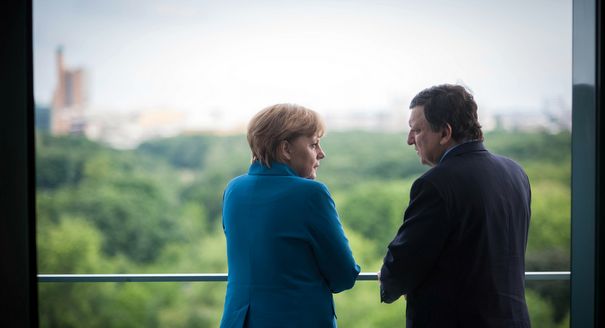Nathalie Tocci, Jan Techau
{
"authors": [
"Jan Techau"
],
"type": "commentary",
"blog": "Strategic Europe",
"centerAffiliationAll": "",
"centers": [
"Carnegie Endowment for International Peace",
"Carnegie Europe"
],
"collections": [],
"englishNewsletterAll": "",
"nonEnglishNewsletterAll": "",
"primaryCenter": "Carnegie Europe",
"programAffiliation": "",
"programs": [],
"projects": [],
"regions": [
"Europe"
],
"topics": []
}
Source: Getty
Europe's Dangerous Leadership Mismatch
Whether Europe's long-term future can be crafted in a constructive and widely accepted way will depend on how Germany and its European partners manage to overcome the leadership mismatch in Europe.
A week ago, Quentin Peel, the FT's Berlin correspondent, wrote that there was no other place in Europe in which the debate about the future of the European Union was discussed as intensively as in Germany. After five days of meetings with German officials and observers in Berlin and elsewhere, my guess would be that he's probably right. The Foreign Ministry, the Chancellory, the Finance Ministry—all of them are working on, or have published, ideas on what the EU should look like after the crisis.
Curiously enough, Foreign Minister Guido Westerwelle, long considered to be the blank spot of German foreign policy, has taken the lead on all this. At his invitation—but not under German leadership, as officials from the Auswärtiges Amt keep on emphasizing—ten generally pro-European foreign ministers are in the process of producing an inofficial paper on how more political integration, including increased legitimacy of the EU, can be organized. Their report is expected to be presented to the public later this year. Other ideas are making the round as well, and, in addition, the usual set of think tankers, academics and elder statesmen from all parts of the political spectrum seem to be exceptionally busy producing a constant flow of substance on the issue.
There are a number of reasons why Germany's officials, despite being utterly absorbed by crisis management, dedicate some serious thinking to this topic. First, the government, despite a persistent sense of uneasiness about it, slowly realizes that Germany is expected by its neighbors and partners to lead, and that remaining passive hurts the country's reputation and diminishes its influence. Secondly, taken aback by the harsh criticism on both Germany's aloofness and harshness in the crisis over the last few years, an increasing number of players within the government are now willing to demonstrate that they indeed care deeply about the EU project. This re-discovered enthusiasm is not shared by all, but the numbers are going up. Finally, strategists at chancellor Angela Merkel's center-right party, the CDU, realize that if they want to use the crisis as a positive selling point during Germany's upcoming general elections this time next year, they must start crafting a wider, more positive narrative now. This poses all kinds of dilemmas, but it assigns brainpower to the European issue.
In a sense, this intellectual offensive shows that traditional German thinking is still very much intact. For 60 years, Germany's answer to its own size and central location in Europe—and, of course, to its past—has been to support European integration as an exercise in self-binding. The country instinctively felt that if wanted to live in peace with its neighbors, it needed to tie itself firmly to them. It's great to see that this old instinct is still intact as it is the key to successful German foreign policy. It also shows how ludicrously wrong critics are who accuse Germany of aspirations to dominate the continent by means of it sheer size and economic firepower. Nowhere in Berlin can such hunger for German dominance in Europe be found. Quite to the contrary.
The problem is that this new German push for more European integration finds no counterpart in Europe. Despite sending foreign ministers to Westerwelle's group of ten, there is no government in Europe that is openly embracing any substantial push towards a closer union at this point. The new French president focuses on inserting Keynesianism into the management of the crisis—against an alleged Teutonic obsession with austerity—and even traditionally pro-European governments, like the one in the Netherlands, have long learned that the quick path to getting very unpopular is via talk about more Europe. Southern Europe is a big miss, as is most of Central and Eastern Europe. So, of course, is the United Kingdom.
All in all, it looks like Europeans want German leadership, but not this kind of leadership. For Germany, and for Europe, there is a grave danger in this mismatch. Germans have reluctantly embraced the idea that much is expected of them. Not only have they been willing to contribute disproportionally to stability mechanisms and bail-out funds, they now also show a budding willingness to give up more of their own sovereignty in order to give Europe a more survivable shape. As is the nature of politics, Germany will want something in return for this, either explicitly or implicitly. So far, in both crisis management and in the debate over Europe's long-term future, Germany's ideas have found few friends. Whether this future can be crafted in a constructive and widely accepted way will to no small degree depend on how Germany and its European partners manage to overcome the leadership mismatch in Europe.
About the Author

Director, Europe Team, Eurasia Group
Techau is director with Eurasia Group's Europe team, covering Germany and European security from Berlin. Previously, he was director of Carnegie Europe.
- Can Europe Trust the United States Again?Commentary
- Pre-Reformation Europe and the Coming SchismCommentary
Jan Techau
Recent Work
Carnegie does not take institutional positions on public policy issues; the views represented herein are those of the author(s) and do not necessarily reflect the views of Carnegie, its staff, or its trustees.
More Work from Strategic Europe
- Europe on Iran: Gone with the WindCommentary
Europe’s reaction to the war in Iran has been disunited and meek, a far cry from its previously leading role in diplomacy with Tehran. To avoid being condemned to the sidelines while escalation continues, Brussels needs to stand up for international law.
Pierre Vimont
- Taking the Pulse: Can European Defense Survive the Death of FCAS?Commentary
France and Germany’s failure to agree on the Future Combat Air System (FCAS) raises questions about European defense. Amid industrial rivalries and competing strategic cultures, what does the future of European military industrial projects look like?
Rym Momtaz, ed.
- Macron Makes France a Great Middle PowerCommentary
France has stopped clinging to notions of being a great power and is embracing the middle power moment. But Emmanuel Macron has his work cut out if he is to secure his country’s global standing before his term in office ends.
Rym Momtaz
- How Europe Can Survive the AI Labor TransitionCommentary
Integrating AI into the workplace will increase job insecurity, fundamentally reshaping labor markets. To anticipate and manage this transition, the EU must build public trust, provide training infrastructures, and establish social protections.
Amanda Coakley
- Can Europe Still Matter in Syria?Commentary
Europe’s interests in Syria extend beyond migration management, yet the EU trails behind other players in the country’s post-Assad reconstruction. To boost its influence in Damascus, the union must upgrade its commitment to ensuring regional stability.
Bianka Speidl, Hanga Horváth-Sántha











